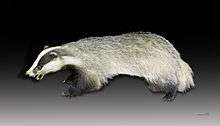Definify.com
Webster 1913 Edition
Badger
Badg′er
,Noun.
[Of uncertain origin; perh. fr. an old verb
badge
to lay up provisions to sell again.] An itinerant licensed dealer in commodities used for food; a hawker; a huckster; – formerly applied especially to one who bought grain in one place and sold it in another.
[Now dialectic, Eng.]
Badg′er
,Noun.
[OE. ]
bageard
, prob. fr. badge
+ -ard
, in reference to the white mark on its forehead. See Badge
,Noun.
1.
A carnivorous quadruped of the genus
Meles
or of an allied genus. It is a burrowing animal, with short, thick legs, and long claws on the fore feet. One species (Meles meles
or Meles vulgaris
), called also brock
, inhabits the north of Europe and Asia; another species (Taxidea taxus
or Taxidea Americana
or Taxidea Labradorica
) inhabits the northern parts of North America. See Teledu
. Webster 1828 Edition
Badger
BADG'ER
,Noun.
BADG'ER
,Noun.
for pistol furniture; its flesh makes good bacon, and its hair is used for brushes to soften the shades in painting. The American badger is called the ground hog, and is sometimes white.
Definition 2026
Badger
badger
badger
See also: Badger
English
Noun

A badger
badger (plural badgers)
- A common name for any mammal of three subfamilies, which belong to the family Mustelidae: Melinae (Eurasian badgers), Mellivorinae (ratel or honey badger), and Taxideinae (American badger).
- A native or resident of the American state, Wisconsin.
- (obsolete) A brush made of badger hair.
- (in the plural, obsolete, vulgar, cant) A crew of desperate villains who robbed near rivers, into which they threw the bodies of those they murdered.
Synonyms
- (animal): brock
- (native or resident of Wisconsin): Wisconsinite
Holonyms
Derived terms
terms derived from badger (noun)
Translations
mammal
|
|
native or resident of Wisconsin — see Wisconsinite
See also
Verb
badger (third-person singular simple present badgers, present participle badgering, simple past and past participle badgered)
- to pester, to annoy persistently.
- He kept badgering her about her bad habits.
- (Britain, informal) To pass gas; to fart.
Synonyms
- (to fart): Wikisaurus:flatulate
Translations
pester
|
fart — see fart
Etymology 2
Unknown (Possibly from "bagger". "Baggier" is cited by the OED in 1467-8)
Noun
badger (plural badgers)
- (obsolete) An itinerant licensed dealer in commodities used for food; a hawker; a huckster; -- formerly applied especially to one who bought grain in one place and sold it in another.
See also
-
 Badger (trade) on Wikipedia.Wikipedia
Badger (trade) on Wikipedia.Wikipedia
Anagrams
French
Etymology
Pronunciation
- IPA(key): /badʒe/
Verb
badger
Conjugation
This is a regular -er verb, but the stem is written badge- before endings that begin with -a- or -o- (to indicate that the -g- is a “soft” /ʒ/ and not a “hard” /ɡ/). This spelling-change occurs in all verbs in -ger, such as neiger and manger.
Conjugation of badger (see also Appendix:French verbs)
| simple | compound | ||||||
|---|---|---|---|---|---|---|---|
| infinitive | badger | avoir badgé | |||||
| gerund | en badgeant | en ayant badgé | |||||
| present participle | badgeant /ba.dʒɑ̃/ |
||||||
| past participle | badgé /ba.dʒe/ |
||||||
| person | singular | plural | |||||
| first | second | third | first | second | third | ||
| indicative | je (j’) | tu | il | nous | vous | ils | |
| simple tenses |
present | badge /badʒ/ |
badges /badʒ/ |
badge /badʒ/ |
badgeons /ba.dʒɔ̃/ |
badgez /ba.dʒe/ |
badgent /badʒ/ |
| imperfect | badgeais /ba.dʒɛ/ |
badgeais /ba.dʒɛ/ |
badgeait /ba.dʒɛ/ |
badgions /badʒ.jɔ̃/ |
badgiez /badʒ.je/ |
badgeaient /ba.dʒɛ/ |
|
| past historic1 | badgeai /ba.dʒe/ |
badgeas /ba.dʒa/ |
badgea /ba.dʒa/ |
badgeâmes /ba.dʒam/ |
badgeâtes /ba.dʒat/ |
badgèrent /ba.dʒɛʁ/ |
|
| future | badgerai /ba.dʒə.ʁe/ |
badgeras /ba.dʒə.ʁa/ |
badgera /ba.dʒə.ʁa/ |
badgerons /ba.dʒə.ʁɔ̃/ |
badgerez /ba.dʒə.ʁe/ |
badgeront /ba.dʒə.ʁɔ̃/ |
|
| conditional | badgerais /ba.dʒə.ʁɛ/ |
badgerais /ba.dʒə.ʁɛ/ |
badgerait /ba.dʒə.ʁɛ/ |
badgerions /ba.dʒə.ʁjɔ̃/ |
badgeriez /ba.dʒə.ʁje/ |
badgeraient /ba.dʒə.ʁɛ/ |
|
| compound tenses |
present perfect | Use the present tense of avoir followed by the past participle | |||||
| pluperfect | Use the imperfect tense of avoir followed by the past participle | ||||||
| past anterior1 | Use the past historic tense of avoir followed by the past participle | ||||||
| future perfect | Use the future tense of avoir followed by the past participle | ||||||
| conditional perfect | Use the conditional tense of avoir followed by the past participle | ||||||
| subjunctive | que je (j’) | que tu | qu’il | que nous | que vous | qu’ils | |
| simple tenses |
present | badge /badʒ/ |
badges /badʒ/ |
badge /badʒ/ |
badgions /badʒ.jɔ̃/ |
badgiez /badʒ.je/ |
badgent /badʒ/ |
| imperfect1 |
badgeasse /ba.dʒas/ |
badgeasses /ba.dʒas/ |
badgeât /ba.dʒa/ |
badgeassions /ba.dʒa.sjɔ̃/ |
badgeassiez /ba.dʒa.sje/ |
badgeassent /ba.dʒas/ |
|
| compound tenses |
past | Use the present subjunctive tense of avoir followed by the past participle | |||||
| pluperfect1 | Use the imperfect subjunctive tense of avoir followed by the past participle | ||||||
| imperative | – | tu | – | nous | vous | – | |
| — | badge /badʒ/ |
— | badgeons /ba.dʒɔ̃/ |
badgez /ba.dʒe/ |
— | ||
| 1literary tenses | |||||||